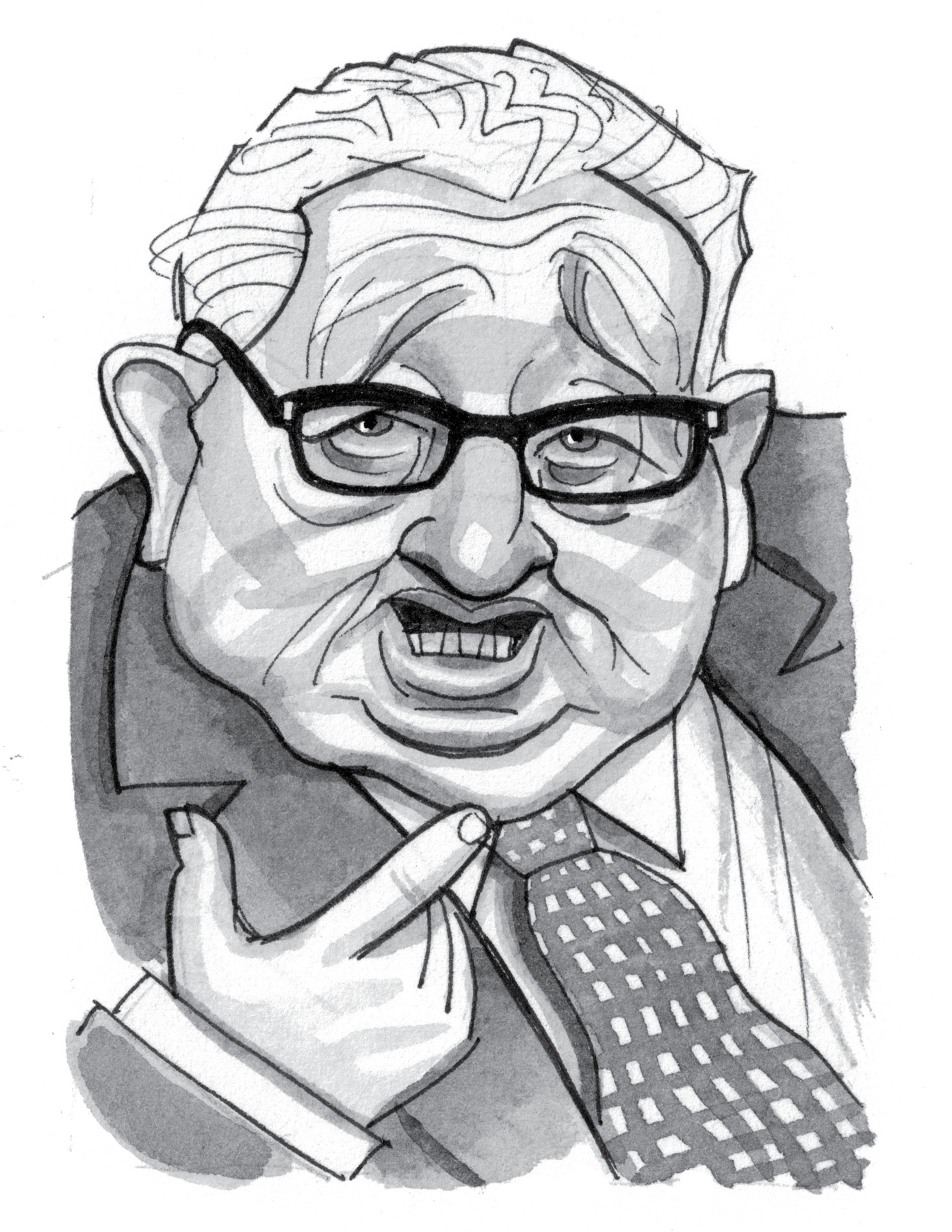Henry Kissinger
BA, Harvard University  MA, Harvard University
MA, Harvard University  PhD, Harvard University
PhD, Harvard University

We’ll get right to everyone’s first question about Henry Kissinger: Is he or is he not a war criminal? The answer is: If he isn’t, who is? Herewith, a fractional, partial, pathetically incomplete display of evidence:
Kissinger Sabotages Vietnam Peace Talks
In 1968, President Johnson was brokering a cease-fire with the North and South Vietnamese governments. He had secretly said he would halt the bombing of North Vietnam on November 1, just before the US presidential election. The governments of both Vietnams appeared to be ready to sign on. Kissinger, a private citizen, not a formal participant in the process, arranged to be in Paris in September while the negotiations were taking place there. With more than a decade of policy wonking at places like the Council on Foreign Relations, the Rockefeller Brothers Fund, the RAND Corporation, and of course various Harvard entities, he knew all the negotiators and wasn’t shy about schmoozing with them, talking shop, and offering advice.
Meantime, he was secretly, treacherously, possibly treasonously, leaking what he learned to Richard Nixon, who was running for president against Hubert Humphrey, Johnson’s vice president. Though he was polling better than Humphrey, Nixon assumed that good news from the negotiations would be bad news for himself. In an effort to guarantee that there would be no good news from Paris before the election, he got word to Nguyen van Thieu,* South Vietnam’s president, that under a Nixon administration his country would get a better deal than he’d get with Humphrey.
Do note that Nixon, like Kissinger, was a private citizen, and that it is a violation of the Logan Act of 1799—a felony, no less—for a private citizen to poke his nose into negotiations between the US government and a foreign nation. Thieu, of course, didn’t give a rat’s ass. He reneged on his agreement with LBJ, tanked the talks, and ensured Nixon’s election. Recent discoveries at the Richard Nixon Presidential Library suggest—if not prove—that the impetus for this came from Nixon himself. Still, whether this was Kissinger’s idea or Nixon’s (with Kissinger merely acting as the messenger), the point remains: It violated the law. It prolonged the war for the sake of political gain. And it resulted in the arguably unnecessary deaths of 20,000 American soldiers, the injury of more than 100,000 others, and the deaths or injuries of more than a million Vietnamese.
What was in it for Kissinger? A featured slot in the Nixon administration, first as national security advisor, then as national security advisor and secretary of state. It wasn’t until just before the next presidential election that peace in Vietnam was said to be “at hand”! And, lo, peace miraculously came just as Nixon was reelected.

Here’s the totally fucking lovely part. Dr. Henry Kissinger was awarded the Nobel Peace Prize* for his part in negotiating the same peace settlement he’d scuttled four years earlier.
Kissinger Expands War, Is Godfather of Khmer Rouge
The Kissinger-enabled continuation of the Vietnam War led the North Vietnamese forces as well as the South Vietnamese Viet Cong forces to take over regions of eastern Cambodia as staging areas for incursions into South Vietnam; supplies came via the Ho Chi Minh Trail through Laos. Kissinger advised Nixon that it was time to expand the war—illegally, without congressional consent—by carpet-bombing vast swaths of Cambodia and Laos. During the ensuing campaign, Cambodia absorbed 3 million tons of US bombs, significantly more than all the bombs dropped during World War II. Countless thousands of civilians were killed, and out of the chaos rose the Khmer Rouge murder cult, which was responsible for another 1.5 to 3 million deaths.
By the way, if you’re keeping score at home, be sure to make note of the facts that a) Kissinger’s grand military and diplomatic strategies were failures—the US lost the war; b) his geopolitical theorizing was incompetent: “all of Southeast Asia” did not go communist; c) the few countries that did (Vietnam, Cambodia, Laos) were hostile to one another and represented the opposite of an “international communist conspiracy”; and, of course, d) all eventually became capitalist societies anyway.
And More
Then there was the time, in 1971, when Bangladesh broke away from Pakistan, and Pakistan retaliated by sending in troops to mass-rape Hindu women and kill as many Hindus as possible. There were up to 3 million murders and 400,000 rapes. Kissinger’s response was to recall the US ambassador, who was begging the administration to intervene. Kissinger also sent a note to the Pakistani dictator who had ordered the butchery, commending him for his “delicacy and tact.”
And don’t forget the Kissinger-engineered CIA coup in Chile, which, in 1973, replaced the democratically elected socialist Salvador Allende with fascist strongman Augusto Pinochet. (See the William F. Buckley entry for a taste of Pinochet’s depravities.) In 1975, meeting with the Chilean foreign minister, Kissinger displayed his legendary wit by ridiculing his own staffers for having put human rights on the agenda. “I read the briefing paper for this meeting,” he said, “and it was nothing but human rights. The State Department is made up of people who have a vocation for the ministry. Because there are not enough churches for them, they went into the Department of State.” The man is hilarious!
We concede that some of Kissinger’s actions might not have risen to the level of “war criminal.” Does selling out the Kurds to appease Saddam Hussein rise to that level? Does supporting Indonesian president and epic embezzler Suharto’s invasion of East Timor rise to that level? You make the call. Or we can keep going. There’s lots more where that came from.